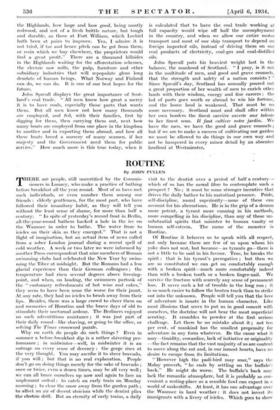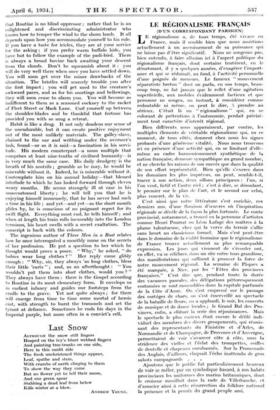ROUTINE
By JOHN PULLEN THERE are people, still uncertified by the Commis- sioners in Lunacy, who make a practice of bathing before breakfast all the year round. Most of us have met such individuals, or even number them among our friends : elderly gentlemen, for the most part, who have followed their insanitary habit; as they will tell you without the least sense of shaMe, for more than half a century. " In spite of yesterday's record frost in Berlin, all-the-year-round bathers hacked a hole in the ice on the Wannsee in order to bathe. • The water froze to icicles on their skin as they emerged." That is not a flight of imagination, but an actual item of news culled from a sober London journal daring a recent spell of cold weather. A week or two later we were informed by anothcr Press correspondent that nine members of Roman swimming clubs had celebrated the New Year by swim- ming the Tiber at midnight. But the Romans had a less glacial experience than their German colleagues ; the temperature had risen several degrees above freezing- point, and when, on landing, the swimmers partook of the " customary refreshments of hot wine and cakes," they seem to have been none the worse for their jaunt. At any rate, they had. no icicles to brush away from their w lips. Besides, there was a large crowd to cheer them on and memories of Horatius and the brave days of old to stimulate their nocturnal ardour. The Berliners enjoyed no such adventitious assistance ; it was just part. of their daily round—like shaving, or going to the office, or solving The Times crossword puZzle. - Why on earth do people do such things ? Even in summer a before-breakfast dip is a rather shivering per- formance ; in midwinter—well, in midwinter it is an outrage on every sense of decency : the gorge rises at the very thought. You may ascribe it to sheer bravado, if you will ; but that is no real explanation. People don't go on doing things merely for the sake of bravado ; once or twice, even a dozen times, may be all very well ; we can all brace ourselves up now and again to face an unpleasant ordeal : to catch an early train on Monday morning ; to clear the snow away from the garden path ; to affect an air of decent stoicism while the dentist plies -the-electric drill: But an eternity of early trains, a daily visit to the dentist over a period of half a century— which of us has the moral fibre to contemplate such a prospect ? No ; it must be some stronger incentive that drives the daily bather to his matutinal penance. Pride, self-discipline, moral superiority—none of these can account for his aberrations. He is in the grip of a demon more potent, a tyrant more cunning in his methods, more compelling in his discipline, than any of those un- substantial spirits that minister to human vanity or human self-esteem. The name of the monster is Routine.
Of Routine it behoves us to speak with all respect, not only because there are few of us upon whom his yoke does not rest, but because—as tyrants go—there is not a little to be said in his favour. True, he breaks the spirit : that is his tyrant's prerogative ; but then we are so constituted we can get on comfortably enough with a broken spirit—much more comfortably indeed than with a broken tooth or a broken finger-nail. We survive the fracture with scarcely any sense of permanent loss. It saves such a lot of trouble in the long run ; it is so much easier to follow the beaten track than to strike out into the unknown. People will tell you that the love of adventure is innate in the human character. Like most illusions that serve to put us in good conceit with ourselves, the doctrine will not bear the most superficial scrutiny. It crumbles to powder at the first serious challenge. Let there be no mistake about it ; not ten per cent. of mankind has the smallest propensity for adventure in any forin whatever. Be the cause what it may—timidity, cowardice, lack of initiative or originality —the fact remains that the vast majority of us are content to move along the rut and, in our inmost hearts, have no desire to escape from its. limitations.
However high the padi-bird may soar," says the Malay proverb, " he ends by settling on the buffalo's back." He might 'do worse. The buffalo's back may lack the romantic atmosphere, but it is probably as con- venient a resting-place as a sensible fowl can expect in a world of makeshifts. At least, it has one advantage over the Wannsee in hard weather : it does not invest its immigrants with a livery of icicles. Which goes to show that Routine is no blind oppressor ; rather that he is an enlightened and discriminating administrator who knows how to temper the wind to the shorn lamb. It all depends upon how you accommodate yourself to his rule. I f you have a taste for icicles, they are at your service for the asking ; if you prefer warm buffalo hide, you have but to follow the example of the padi-bird. There is always a broad bovine back awaiting your descent from the clouds. Don't be squeamish about it : you will do very well there when once you have settled down. You will soon get over the minor drawbacks of the situation. The bristles will scarcely trouble you after the first impact ; you will get used to the creature's awkward paces, and as for his snortings and bellowings, they will soon cease to alarm you. You will become as indifferent to them as a seasoned cockney to the racket of Fleet Street or Mark Lane. Curl yourself up between the shoulder-blades and be thankful that fortune has provided you with so snug a retreat.
Habit is like a drug. It not only deadens our sense of the unendurable, but it can create positive enjoyment out of the most unlikely materials. The galley-slave, chained to the oar and writhing under the overseer's lash, found—or so it is said—a fascination in his servi- tude. His modern counterpart—a noun multiple that comprises at least nine-tenths of civilized humanity—is in very much the same case. His daily drudgery is the breath of his nostrils ; grumble as he may, he would be miserable without it. Indeed, he is miserable without it. Contemplate him on his annual holiday—that blessed interlude to which he has looked forward through eleven weary months. He seems strangely ill at ease in his unaccustomed liberty ; he will tell you that he is enjoying himself immensely, that he has never had such a time in his life ; and yet—and yet—as the short month glides by, he is conscious of no poignant regret for its swift flight. Everything must end, he tells himself ; and when at length his train rolls inexorably into the London terminus, his heart swells with a secret exaltation. The conscript is back with the colours.
The ingenious author of Three Men in a Boat relates how he once interrogated a monthly nurse on the secrets of her profession. He put a question to her which he thought would prove a poser. " Why," he asked, " do babies wear long clothes ? " Her reply came glibly enough : " Why, sir, they always 'as long clothes, bless their little 'earts " ; and, as an afterthought : " You wouldn't put them into short clothes, would you ? " They always have them : there is the Gospel according to Routine in its most elementary form. It envelops us in earliest infancy and guides our footsteps from the cradle. to the grave. Yet not quite always ; for there will emerge from time to time some mortal of heroic cast, with strength to burst the trammels and set the tyrant at defiance. Sometimes he ends his days in the Imperial purple, but more often in a convict's cell.









































 Previous page
Previous page